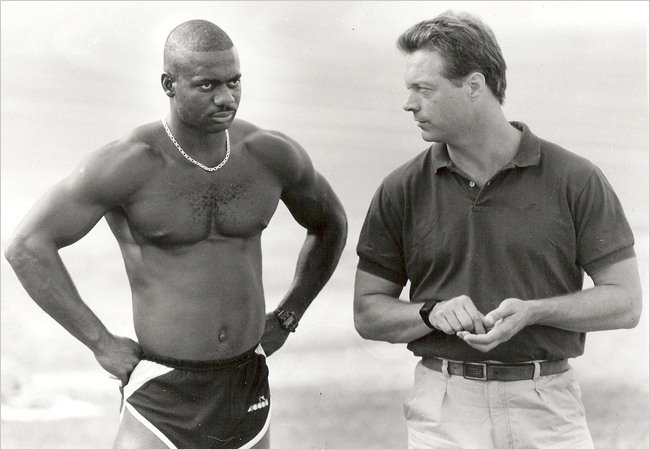
The late Charlie Francis was considered by many to be one of the greatest sprint coaches in the history of athletics. But most have chosen to label him simply as the “disgraced” ex-coach of Ben Johnson. Anti-doping crusaders remember Francis for his refusal to apologize for his role in the Ben Johnson steroid scandal. Yet, few people have been more honest about the state of doping in sports than Francis.
Canadian Ben Johnson tested positive for stanozolol (Winstrol) after winning the 100-meter finals at the 1988 Summer Olympics in Seoul. The Canadian government investigated the steroid scandal in what became known as the “Dubin Inquiry”. Francis was one of the primary targets of the investigation.
After being subpoenaed to testify, Francis admitted introducing and providing steroids to Johnson and other elite Canadian athletes. Francis told the commission that steroids were a requirement for athletes who participated at the elite level.
“[Ben Johnson] could decide either he wanted to participate at the highest levels in sport or not. If he wanted to compete, it’s pretty clear that steroids are worth approximately a meter at the highest levels of sport,” Francis testified. “And he could decide to set up his starting blocks at the same line as all the other competitors in the international competition or set them a meter behind them all. And obviously that would be an unacceptable situation for a top-level athlete.”
Athletics Canada, the sport governing body for track and field in Canada, gave Francis a lifetime ban as a consequence of his admission. At the same time, the Dubin Report outlined a set of criteria that, if met, could lead to the possibility of future reinstatement.
“I’m told I can get myself re-instated,” Francis told Mike Fish of ESPN. “But, well, the only way you can get reinstated is to say [the testimony] was all bullshit. That I was wrong. What is the point of it? So I just stay out of it.”
Francis had no desire for contrition, remorse or the promotion of drug-free sport.
Francis chose honesty instead. He maintained that, even in the post-Ben Johnson period, steroid use was pervasive and required to compete at the elite level.
“The only way to go back into [track] is to sort of act like, ‘Oh, I was wrong. Drugs aren’t necessary. Gee kids,'” Francis told CBC Radio’s The Inside Track during a 1990 interview. “And adopt the party line and go through some miraculous Saul-like conversion and come back out and toe the party line, and I’m not prepared to do that.”
Francis alluded to the Biblical story of Saul of Tarsus. Saul zealously opposed Christianity and led a crusade to eliminate all Christians after the resurrection of Jesus. After being “blinded by the light” and hearing the voice of Jesus, Saul underwent an instant 180-degree conversion and became one of history’s most influential Christian missionaries. Saul changed his name to Paul the Apostle and went on to write a significant portion of the New Testament.
Such was the expertise of Francis that world-class athletes secretly consulted with Francis in spite of his lifetime ban.
In 2000, Francis became a member of “Project World Record.” The project was organized by BALCO’s Victor Conte to propel sprinter Tim Montgomery towards the title of the “world’s fastest man.” The project succeeded when Montgomery set the 100-meter world record of 9.78 in September 2002.
Francis had good reason to maintain his position that steroids were a prerequisite for success in elite track and field. Montgomery’s world record was reportedly achieved with the help of the once-undetectable designer steroid known as tetrahydrogestrinone (THG).
The BALCO scandal exposed the widespread use of steroids and PEDs throughout a variety of sports. The 2002 United States government investigation into BALCO made it clear that steroids were still everywhere.
The omertà (code of silence) was broken for the first time with the Ben Johnson scandal. The omertà was broken once again with the BALCO scandal. Each time the anti-doping crusaders promised “clean sport” would come as a result.
Francis knew better. Francis knew the truth about steroids in sports. He never believed in the fairy-tale of “clean sport”. He never wavered in the face of considerable pressure. And he was right.
The miraculous “Saul-like conversion” never happened. Francis did not disingenuously become an anti-doping crusader like so many other athletes have done after getting caught using steroids.
Francis died on May 12, 2010 after a five-year battle with cancer. He remained unrepentant at his death.
It is unfortunate that Francis is not still alive to see the omertà broken yet again during the Lance Armstrong scandal. And to laugh at the proclamations of “clean sport” in its aftermath.
“Plus ça change, plus c’est la même chose.”

Source:
CBC. (May 12, 2010). Former sprint coach Francis dies of cancer. Retrieved from http://www.cbc.ca/sports/amateur/story/2010/05/12/sp-francis-death.html
Fish, M. (May 13, 2010). Francis didn’t run from steroids truth. Retrieved from http://sports.espn.go.com/oly/columns/story?id=5186345
About the author
Millard writes about anabolic steroids and performance enhancing drugs and their use and impact in sport and society. He discusses the medical and non-medical uses of anabolic-androgenic steroids while advocating a harm reduction approach to steroid education.

Leave a Reply
You must be logged in to post a comment.